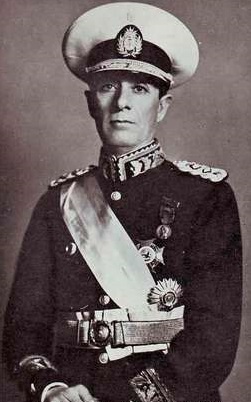Pedro Pablo Ramírez facts for kids
Quick facts for kids
Pedro Pablo Ramírez
|
|
|---|---|
 |
|
| President of Argentina | |
|
De facto
|
|
| In office 7 June 1943 – 23 February 1944 |
|
| Appointed by | Military junta |
| Vice President | Sabá Sueyro (Jun–Oct 1943) Edelmiro Julián Farrell (1943–1944) |
| Preceded by | Arturo Rawson (de facto) |
| Succeeded by | Edelmiro Julián Farrell (de facto) |
| Personal details | |
| Born | 30 January 1884 La Paz, Entre Ríos |
| Died | 12 May 1962 (aged 78) Buenos Aires |
| Nationality | Argentine |
| Spouse | María Inés Lobato Mulle |
| Profession | Military |
| Signature |  |
| Military service | |
| Branch/service | Argentine Army |
| Years of service | 1904–1944 |
| Rank | Major General |
Pedro Pablo Ramírez Menchaca (born January 30, 1884 – died May 12, 1962) was an Argentine military leader. He served as the President of Argentina from June 7, 1943, to February 24, 1944. He believed in a strict type of government and founded a group called Guardia Nacional.
Contents
Early Life and Military Career
Pedro Pablo Ramírez started his military journey in 1904. He graduated from the Argentine military college as a second lieutenant. By 1910, he was promoted to first lieutenant in the cavalry.
Training in Germany
In 1911, Ramírez traveled to Germany for special training. He joined the Fifth Hussars cavalry unit there. This was part of the Prussian Army, led by Kaiser Wilhelm II. He returned to Argentina in 1913, just before World War I began. He also married a German woman during his time abroad.
Rise in the Army
Ramírez became an expert in cavalry tactics. In 1930, he helped General José Félix Uriburu overthrow the government of Hipólito Yrigoyen. This was a time when many countries faced political changes. After this, Ramírez was sent to Rome, Italy. He observed the army of Benito Mussolini, who was a leader with very strong control over his country. Ramírez returned to Argentina in 1932.
Political Involvement and Leadership
After Uriburu's time in power ended, Ramírez began to plan for a new type of government in Argentina. He wanted a system where the military had a lot of control.
Forming Political Groups
Over several years, Ramírez organized a group called the Milicia Nacionalista. This group later became known as the Guardia Nacional. He also wrote plans for how the country should be run by the military. In 1942, President Ramón Castillo appointed Ramírez as the Minister of War. In this role, Ramírez started to reorganize the Argentine Army. At the same time, the Guardia Nacional joined with another group to form "Recuperacion Nacional." This was a political party that supported a very strong government.
Becoming President
President Castillo removed Ramírez from his position on May 18, 1943. However, just two weeks later, on June 4, 1943, Ramírez helped Arturo Rawson overthrow Castillo's government. Ramírez was again made Minister of War. Only three days later, on June 7, Ramírez forced Rawson to resign. He then became the President of Argentina.
Argentina During World War II
During his time as president, Pedro Pablo Ramírez kept Argentina neutral in World War II. This meant Argentina did not take sides in the war. Because of this, the United States did not send aid to Argentina. Later, Argentina did declare war on Germany and Japan. This happened during the government of Edelmiro Farrell, who became president after Ramírez.
Legacy
Even though Pedro Pablo Ramírez became president through a coup d'état (meaning he took power by force), some historical accounts do not call him a dictator. He played a key role in Argentine politics during a complex time in history.
See also
 In Spanish: Pedro Pablo Ramírez para niños
In Spanish: Pedro Pablo Ramírez para niños
 | Toni Morrison |
 | Barack Obama |
 | Martin Luther King Jr. |
 | Ralph Bunche |

